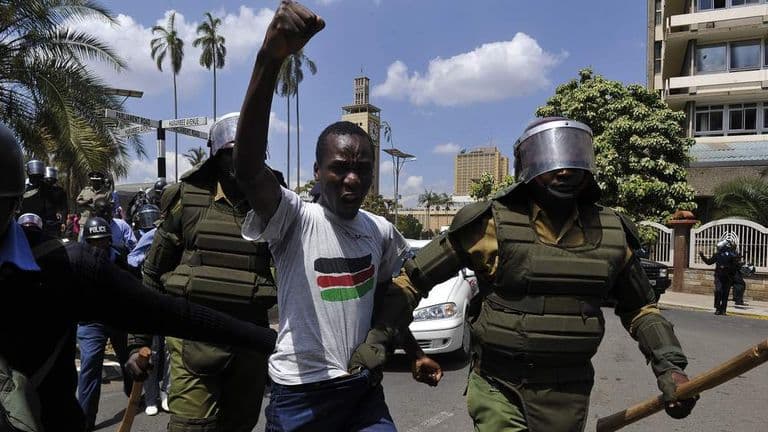We're loading the full news article for you. This includes the article content, images, author information, and related articles.
A recent political intervention has ignited a fierce debate in Kenya regarding rising crime rates and the effectiveness of current government strategies, prompting calls for enhanced security measures and accountability.

The issue of public safety has taken centre stage in Kenya following a high-profile political visit that aimed to highlight concerns over escalating crime. On Wednesday, October 15, 2025, a delegation of opposition figures arrived in Nairobi, asserting that the city was grappling with an 'out of control' crime crisis. This move has been widely interpreted as a political manoeuvre, drawing both support and criticism regarding its intent and potential impact on genuine efforts to address insecurity.
The opposition's claims, articulated in an op-ed published in a local daily, painted a stark picture of Nairobi, drawing parallels to historical periods of significant unrest. The article suggested a city 'overrun by crime and political violence,' evoking an era where 'strikes turned ugly, gangs roamed the streets and ordinary citizens were forced to hire private guards to keep their families safe.' This historical comparison has been met with scrutiny, with some analysts questioning its accuracy and relevance to the current situation.
Kenya has a complex history with crime and security challenges, often intertwined with political cycles. Periods of economic hardship or heightened political tension have historically correlated with spikes in criminal activity. The current debate emerges against a backdrop of public concern over various forms of crime, from petty theft to more organised criminal enterprises. Government statistics and independent reports often present differing perspectives on the actual scale and trends of crime, making it a contentious issue in public discourse.
Kenya's legal framework for addressing crime is robust, encompassing the National Police Service Act, the Penal Code, and various other statutes aimed at maintaining law and order. The government has consistently affirmed its commitment to combating crime through initiatives such as community policing, increased police presence, and technological investments in surveillance. However, the effectiveness of these policies is frequently debated, with critics pointing to implementation gaps and resource constraints.
The recent political statements have resonated with some residents who feel increasingly vulnerable to crime. Testimonies from various community leaders and citizens often highlight the psychological impact of insecurity and the need for more visible and responsive law enforcement. Conversely, government officials and some security experts argue that while challenges exist, the situation is not as dire as portrayed by the opposition, citing ongoing efforts and successes in crime reduction in specific areas.
Accurate and up-to-date crime statistics are crucial for informed policy-making. The Kenya National Bureau of Statistics (KNBS) is the primary source for official crime data, typically released annually. However, the timeliness and granularity of this data can sometimes be a point of contention. For instance, the latest KNBS Economic Survey (published in 2024) indicated a slight increase in certain categories of reported crimes in 2023 compared to the previous year, though overall trends can vary significantly by region and type of offence.
The politicisation of crime carries several risks. It can erode public trust in institutions, create unnecessary panic, and potentially divert attention from evidence-based solutions. For Kenya, a stable security environment is vital for economic growth, investment, and tourism. Exaggerated claims of insecurity, regardless of their political motivation, can have tangible negative impacts on these critical sectors.
A key area of uncertainty remains the precise, up-to-the-minute crime statistics for Nairobi and other major urban centres. While official annual reports provide a general overview, real-time data that could inform immediate policy responses is often less accessible to the public. The methodology used by various political actors to assess the 'out of control' nature of crime also remains a point of controversy, often lacking transparent data sources.
The current debate is likely to intensify as the country approaches the next election cycle. Political parties are expected to continue using security as a campaign issue, prompting the government to further articulate its strategies and demonstrate progress in combating crime. Public forums and parliamentary debates on security matters are anticipated in the coming months.
Observers will be keenly watching for the release of more recent and detailed crime statistics from official government sources. The response of the National Police Service to the heightened scrutiny, including any new initiatives or operational changes, will also be critical. Furthermore, the tone and substance of political discourse surrounding crime will be important to monitor, to discern whether it contributes to constructive solutions or further polarises the public.
Keep the conversation in one place—threads here stay linked to the story and in the forums.
Sign in to start a discussion
Start a conversation about this story and keep it linked here.
Other hot threads
E-sports and Gaming Community in Kenya
Active 9 months ago
The Role of Technology in Modern Agriculture (AgriTech)
Active 9 months ago
Popular Recreational Activities Across Counties
Active 9 months ago
Investing in Youth Sports Development Programs
Active 9 months ago